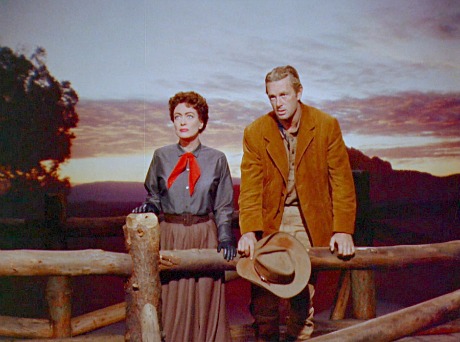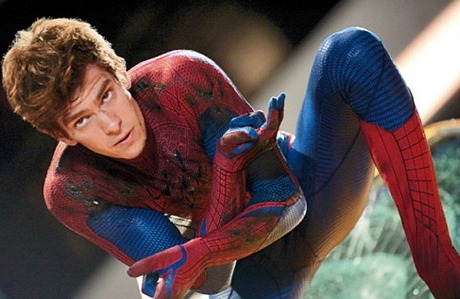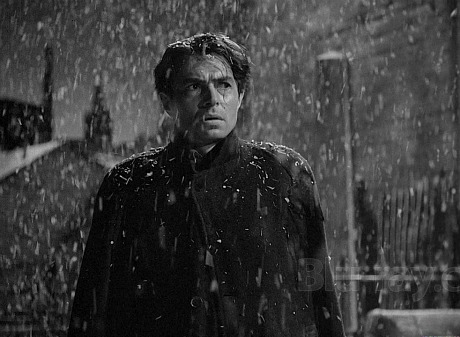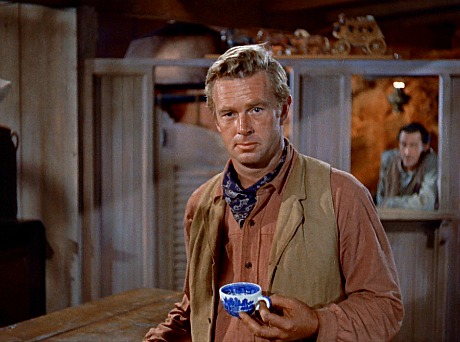What’s the point of being a 1.85 fascist if you’re not going to be that thing when some renegade Bluray distributor defies the rules? Does Bob Furmanek believe that all non-Scope Hollywood studio films released after April 1953 were projected at 1.85 or not? Olive Films’ forthcoming Bluray of Nicholas Ray’s Johnny Guitar (originally released on 5.27.54) is presented at 1.37 to 1, despite the fact that the 1.85 mandate had been adopted by the nation’s theatres approximately 13 months before the film’s theatrical release. And not a single 1.85 fascist has said boo.
Bluray.com’s Jeffrey Kauffman hasn’t mentioned it. DVD Beaver‘s Gary Tooze notes that the film was “composed for 1.66” but presented at 1.37.
You may not agree with my “boxy is beautiful” theology, but at least I say what I feel and let aspect-ratio revisionists like Furmanek have it with both barrels when they advocate for the CLEAVER-ing of classic ’50s films that have been savored for decades at 1.33 or 1.37. At least I respond like a man, which is more than you can say for Furmanek and his ilk. Am I wrong? Has Furmanek written anything? Has anyone?
I can already hear the counter-argument. Johnny Guitar wasn’t a big-studio film — it was produced by Republic Pictures — and was therefore exempt from the 1.85 masking rule that applied to all major releases in all of the nation’s theatres. But Ray and his producer, Herbert J. Yates, were obviously aware that the 1.85 word had gone out and that theatres were using 1.85 aperture plates on all non-Scope films. By what logical basis would Ray and his dp, Harry Stradling Sr., compose for 1.37 and expect that it would be seen that way in theatres? They might’ve composed for 1.37 in their hearts (as I believe Elia Kazan and Alfred Hitchcock did during filming of On The Waterfront and Dial M for Murder) but there was no rational reason for them to expect that their film would be projected at 1.37, at the very least in big-city theatres where the new standard was adopted right away.

Conversation between two projectionists in the booth for New York’s Mayfair theatre (later called the DeMille) on 5.28.54:
Projectionist #1: Where are the 1.37 aperture plates?
Projectionist #2: Why do you wanna know? We don’t use those any more.
Projectionist #1: Okay, but after closing last night I ran Johnny Guitar last night at 1.37 — I was curious, all right? I’m also sentimental — and it looks pretty good. It looks nice and boxy with plenty of headroom so fuck it…why don’t we just run it that way for the public?
Projectionist #2: But everything is projected at 1.85 now. Has been for a year now. Whaddaya doin’? You can’t improvise this stuff. 1.85 is the new law.
Projectionist #1: Have you read the instructions from Republic?
Projectionist #2: No. What are they gonna say, keep it focused?
Projectionist #1: The instructions say run it at 1.66 but we can do anything we want — we can show it at either 1.85, 1.37 or 1.66 — our choice.
Projectionist #2: But Dial M For Murder, which opens tomorrow, is being projected at 1.85. That’s what they’re requiring. They can’t go back and forth like this. Run this film at 1.37, run that one at 1.85, run the next one at 1.66. It’s too confusing. I don’t want to lose my job over this shit. We need to stick to a single standard.
Projectionist #1: Fuck it. Are we free men or slaves? What do those assholes know? The film delivers an image of 1.33. Who are they to say whack it down to 1.85? Fuck those guys.
Projectionist #2: Well, I’m a slave. A living slave.
My belief is that aspect ratios were fiddled with by projectionists all across the country from the mid ’50s to mid ’60s. Projectionists improvised — they did what they wanted because they wanted to. Some went with 1.85, some stuck to the old way because they liked it, some used 1.66 aperture plates, some showed Johnny Guitar at 1.37, some showed Johnny Guitar at 1.85, some showed Johnny Guitar at 1.66, some showed John Cassavetes‘ Shadows at 1.37 and many showed Roman Polanski‘s Rosemary’s Baby at 1.66. And TV stations definitely went with 1.33 or 1.37, and so did VHS, laser discs (except for this many, many laser discs that went with 1.66 aspect ratios) and DVDs.
Only in yellowed trade paper reports and in the steel bear-trap minds of 1.85 fascists was 1.85 absolutely adhered to without exception in each and every theatre, all the time starting in April 1953.








